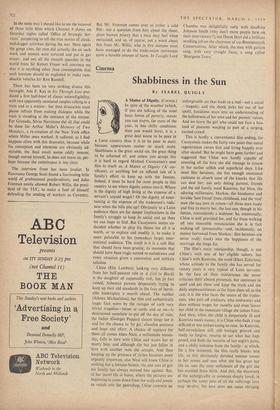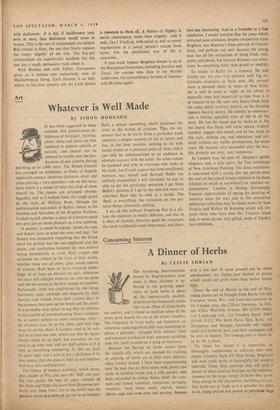Cinema
Shabbiness in the Sun
QUIGLY By ISABEL
A Matter of Dignity. (Curzon.) IN spite of the weather (which, if you are talking of the most basic forms of poverty, means you can starve, for most of the because appearances matter so much more. Shabbiness is the great social sin, the great thing to be ashamed of; and unless you accept this it is hard to regard Michael Cacoyannis's new film to reach us, A Matter of Dignity (`A' cer- tificate), as anything but an inflated tale of a family's effort to keep up with the Joneses. Indeed, it must be hard for most people in this country to see where dignity conies into it. Where is the dignity of high living at the expense of a servant's unpaid wages? Or the dignity of enter- taining at the expense of the tradesmen's rude- ness when the bills pile up? Obviously to a Latin audience there are far deeper implications in the family's struggle to keep its social end up than we can hope to find. But Cacoyannis seems un- decided whether to play his theme for all it is worth, or to explain and modify it, to make it more palatable to his (nowadays large) inter- national audience. The result is it is a soft film that should have been granite; its moments that should have been tragic turned to melodrama and every situation given a convenient and unlikely solution.
Chloe (Elle Lambetti, looking very different from her half-peasant role in A Girl, in Black) is the daughter of supposedly rich, but in fact ruined, Athenian parents desperately trying to keep up their old standards in the face of inevit- able bankruptcy a month ahead. The mother (Athena Michaelidou), her thin and authentically tragic face worn by the ravages of such very trivial tragedies—losses at cards and so on—is determined somehow to put off the day of ruin; the father (Georges Pappas) almost longs for it and for the chance to `let go,' abandon pretence and hope and effort. A chance of reprieve for them all comes when Nico, a millionaire nonen- tity, falls in love with Chloe and wants her to marry him; and although she has just fallen in love with another man she accepts. And then keeping up the pretence of riches becomes more urgently important, else Nico will know Chloe is nothing but a fortune-hunter, the one sort of girl his family has always warned him against. But, in her secret life at home, where the pictures are beginning to come down from the walls and jewels to vanish into the pawnshop, Chloe commits an unforgivable sin that leads to a real—not a social —tragedy; and the shock jerks her out of her spoilt, fastidious ways into an understanding of the hollowness of her own and her parents' values. And we leave the girl who could not face a bus- load of peasants weeping as part of a• surging, excited crowd.
This is hardly a conventional film ending, for Cacoyannis makes the fairly rare point that moral regeneration comes first and living happily ever after second. But he might have gone further and suggested that Chloe was hardly capable of arousing all the love she did manage to arouse in her earlier selfish and superficial days. Like most film heroines, she has enough emotional cushions to absorb most of the knocks that life can deal her; not only doting parents, friends and the old family maid Katerina, but Nico, the adoring millionaire, Markos, the handsome and lovable `best friend' from childhood, and the 'real' man she cau love in return—all three men ready and free to marry her, the last one, though in his forties, conveniently a widower. So, emotionally, Chloe is well provided for, and far from .walking off into miserable renunciation she is in fact walking off (presumably—and, incidentally, on money borrowed from Markos : film heroines are never really stuck) into the happiness of the marriage she longs for.
The film's main relationship, though, is not Chloe's with one of her eligible suitors, but Chloe's with Katerina, the maid (Eleni Zafariou), whose attitude to the family she has served, for twenty years is very typical of Latin servants. In the face of their misfortunes she never criticises their absurd pretences, but continues to spoil and pet them and keep the truth and the daily unpleasantnesses as far from them all as she can; it is she who faces the sneers of the trades- men, who puts off creditors, who overworks and does without wages for months and even leaves her child in the mountain village she comes from. And then, when the child is desperately ill and Katerina needs money, it is Chloe who finds it too difficult or too embarrassing to raise. So Katerina, half-incredulous still, still lovingly, grieved and ready to forgive, returns to see what has hap- pened, and finds the remains of last night's party, and a chilly welcome from the family : at which, for a few moments, the film really breaks into life, as this obstinately devoted woman conies to her senses and sees what she has given her life to, sees the utter selfishness of the girl she has nannied from birth. And this, the discovery of the unforgivable in someone deeply loved, is perhaps the worst pain of all the sufferings love may involve, for love does not cease abruptly with disillusion: if it did, if indifference took over at once, then disillusion would cease to matter. This is the sort of relationship you seldom find treated in films, the one that finally exposes the empty 'dignity' of the title. The boy-girl relationships are superficially handled; but this one has a tough, persuasive truth about it.
With Bardem and with Fellini, Cacoyannis gives us a serious and melancholy view of Mediterranean living. Each director is as indi- vidual as his own country, yet the Latin gloom is common to therm all. f Matter of Dignity is social commentary more than tragedy : and it ends, like I Vitelloni, witit social as well as moral regeneration in a young person's escape from home. For the established way of life is untenable.
A four-week Ingmar Bergman season is on at the Hampstead Everyman, including Sawdust and Tinsel, for anyone who likes to see Harriet Andersson, the extraordinary heroine of Summer with Monika, again.



































 Previous page
Previous page